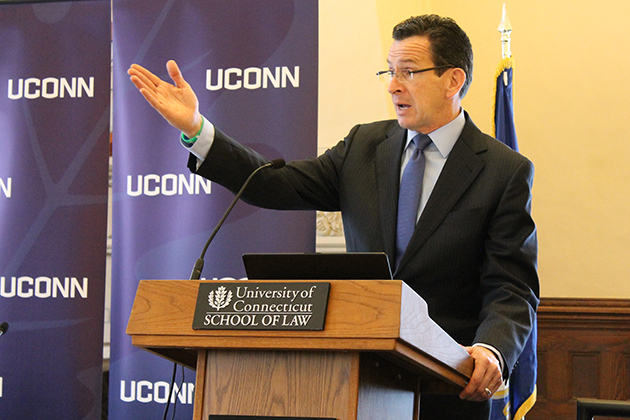
Calling water “Connecticut’s greatest natural resource,” Gov. Dannel P. Malloy told a group of state water experts Monday at a conference organized by UConn that the time has come for the state to develop and implement a strategic water plan.
Citing an as yet unfulfilled 1967 statute mandating the creation of such a plan, Malloy deadpanned, “I think we’ve waited long enough to get started.
“Smart water policy is smart economic and environmental policy,” he said, in remarks to about 150 state policymakers, regulators, environmental protection advocates, water industry professionals, and academics attending the day-long “Connecticut Strategic Water Resources Planning Conference” at the University of Connecticut’s School of Law in Hartford.
Ecologist Gene Likens, founder of the Cary Institute and special advisor on environmental affairs to UConn President Susan Herbst, agreed.
“We have an historic opportunity to help guide and foster implementation of a strategic water resources plan for the state,” said Likens, who, at the encouragement of Herbst, invited state and university water experts to examine state-of-the-art water resource plans in other states and identify opportunities and obstacles to developing a similar plan for Connecticut.
“UConn is committed to environmental stewardship – and that does not stop at the borders of our campuses,” said Likens. He recalled how recent negotiations to supplement the University’s water supply – triggered by the development envisioned by Next Generation UConn, the plan to support major expansions across three campuses – brought into sharp focus the state’s lack of a comprehensive water plan.
It was then, Likens said, that he and Thomas Callahan, UConn’s associate vice president for infrastructure planning and strategic project management, began discussions with faculty, environmental advocates, and state regulators about the benefits of hosting a conference. Together they agreed that with prudent management of Connecticut’s water resources so critical to the entire state, it was imperative that UConn offer its expertise to help in strategic water planning for the state.
Despite a consensus that it’s time for Connecticut to act to meet its long-term water management needs, differing policy priorities and a lack of resources and clear accountability, which deterred earlier efforts to create and implement a strategic water plan for the state, still remain.
Small water companies, for example, established years ago are struggling to generate new supplies as the villages they once serviced expand. Underground water supplies and the rivers and streams they support are threatened by excessive pumping to meet suburban demands. Regulations to maintain minimum flows in rivers and streams and the aquatic habitats they support restrict supplies to farmers and local water companies. And little has been done to upgrade water system infrastructure built years ago that serves the state’s larger cities.
One thing seems clear, water resources are getting increased scrutiny, and that attention ultimately could reshape which resources are protected and conserved, and how that will be managed.
“That’s why the Water Planning Council is already at work and has engaged UConn for technical assistance to keep Connecticut on track for sustainable water resources for years to come,” said Malloy. The Water Planning Council is the state agency that currently oversees management of the state’s water resources.
With the state Legislature’s annual session commencing this week, Malloy vowed, “I commit to you today that we will get a statewide water resource plan done. … We have the opportunity to tackle water now.”
“We must be smart stewards and plan ahead to preserve water for future generations while we have the luxury of its abundance,” he said, noting that drought affects many parts of the globe. “By taking on the task of developing a statewide strategic water plan now, we can reduce climate change uncertainty, plan effectively for future demand, and maintain water as an asset.”
Malloy’s expectations matched those of conference organizers, who in an effort to focus attention on the complex mix of challenges facing management of the state’s water resources, hosted the conference and workshop to brainstorm ideas on a vision and guiding principles for managing Connecticut’s water resources, and to develop a process for moving forward in the creation of a statewide water plan.
“We thought that a conference by UConn would greatly inform discussions about the availability of water, and that the expertise and technical resources at the University could help facilitate a strategic water plan for the state,” Likens told the conference attendees. “UConn has offered technical assistance and expertise to the Water Planning Council, and is participating with many of you in the legislative deliberations in the development and furtherance of a plan.”
University of Massachusetts professor Richard Palmer, a civil and environmental engineer with special expertise in water planning, delivered the keynote speech, which was followed by panel discussions led by a variety of state and regional experts.
“Other states have found that to comprehensively plan for the effective management of their water resources, regional and local water planning is necessary,” said Palmer, who conducted studies in Colorado and Georgia that suggested how those states should develop statewide water plans and what should be included in them. “Public engagement has become extremely important; water plans are a participatory process.”



